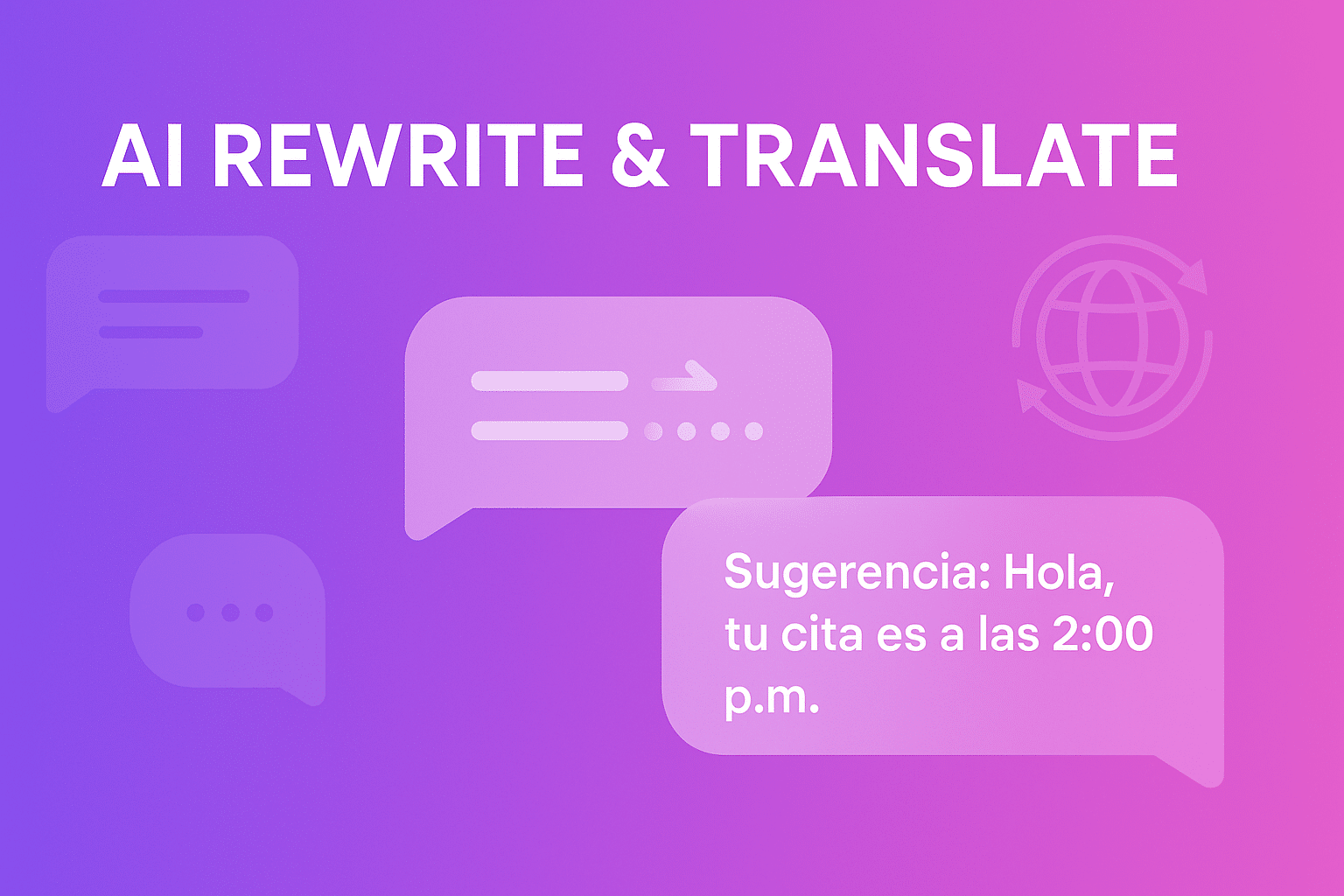
Best Texting App for Business: Ranked and Reviewed (2026)
Staying in touch with customers shouldn’t be complicated. But for many businesses, it still is.
Missed calls, delayed responses, and cluttered inboxes can turn everyday communication into a challenge. While people are quick to respond to texts in their personal lives, most businesses haven’t found a smooth way to bring texting into their daily workflow.
Relying only on email or phone makes it easy for things to get delayed or overlooked. Also, using different tools for booking, reminders, and messages can quickly become too much to manage.
That’s why more businesses are looking into texting apps made for business use. These platforms make it easier to send updates and keep conversations in one place.
In this article, we’ll look at what makes a good texting app for business, how to choose the right platform, and which texting solution stands out.
Why Use a Texting App for Business?
If you’re running a business, you’ve probably dealt with missed calls and customers who don’t respond when you need them to. You try to follow up, maybe send reminders or updates, but it takes time.
That’s where a texting app for business can help you do things differently.
Faster Replies
One of the most common problems businesses face is waiting for customers to respond.
You send an email asking someone to confirm a time or approve a quote, and you don’t hear back. Then you follow up, which takes more of your time. A texting app helps reduce that delay.
Instead of a long message that gets lost in an inbox, you send a short, direct question. That kind of message takes seconds to write, and for the customer, replying is just as easy.
Cut Down on Missed Appointments
No-shows hurt your schedule and your revenue. A missed appointment means wasted time and lost income, and in many cases, it could have been avoided with a quick reminder.
A texting app lets you send these reminders automatically, so you’re not spending time manually reaching out.
You can set the app to send a message 24 hours before the appointment and then again a few hours ahead. If the customer needs to cancel or reschedule, they can reply directly, and you’ll know right away.
Don’t Have to Send Every Message Manually
Running a business means juggling a lot at once. You might want to follow up with customers, send thank-you notes, or remind someone to book again. But you don’t always have time.
A texting app lets you set these messages to go out automatically based on actions your customer takes.
When someone books a session online, you can send a welcome message right away. A few days later, you can check in with a simple “Hope everything went well. Do you need anything else?” If they haven’t returned in a few weeks, you can follow up with a friendly nudge.
These messages are prepared ahead of time and sent without you needing to remember or log in each time.
Stay Compliant
There are rules around how you collect numbers, what you can say, and how people can opt-out. A good texting app helps you follow those rules without needing to figure them out on your own.
You’ll be able to add opt-in forms to your website or booking system, automatically include opt-out instructions in every message, and keep a full log of what’s been sent.
If your business deals with health or financial details, you might need to protect personal data, too.
Some apps offer support for privacy needs, like HIPAA-compliant texting, which is useful for healthcare providers, therapists, or medical offices that send appointment reminders or follow-ups.
Keep Everything Simple and Organized
As your business grows, so does your need to keep messages clear, timely, and in one place.
Using your personal phone for work texts gets chaotic fast. You lose track of conversations, forget to follow up, or send the wrong message to the wrong person.
A texting app helps you manage all of this. It gives you one dashboard to view all messages and see which messages were delivered, who replied, and what still needs attention.
Text Your Team
Business texting apps also help you stay in touch with your team, especially if you manage shifts, mobile staff, or remote workers. You can send updates to employees about schedule changes, last-minute needs, or quick notes during the workday.
How to Choose the Best Texting App for Your Business
If you’re sending messages to five people a week, you’ll need something very different from someone sending out hundreds of texts every day.
Here’s how you can make the right choice without guessing or getting stuck with something that doesn’t work for you.
Start With Your Main Use Case
Think about how you plan to use the texting app. Are you sending appointment reminders? Running marketing campaigns? Following up with leads?
Some apps are better for one-on-one communication, while others are built for large group messages.
Choosing based on your most common task helps you avoid paying for features you’ll never use or missing the ones you actually need.
Check Message Volume and Contact Size
Apps are often priced based on message volume. Some charge per text, while others offer monthly bundles.
If you’re just getting started, pay-as-you-go pricing can keep costs down. But if you’re growing and sending a monthly plan more often, it may save you money in the long run.
Also, make sure the platform can handle your list size. Some lower-tier plans limit how many contacts you can have, even if you aren’t sending messages to all of them at once.
Look at Features That Fit Your Day-to-Day
Every texting app offers basic messaging, but you’ll want to dig deeper into the tools that help you run your business better.
Here are some features that make a real difference:
- Automation: Can you set messages to go out based on time or customer actions?
- Two-way texting: Can you hold real conversations, not just send one-way blasts?
- Templates: Can you save and reuse common replies like “Thanks for booking” or “We’re on our way”?
- Personalization: Can you include customer names, locations, or details in bulk messages?
- Team access: Can multiple people send and respond from one shared number?
If you’re managing client bookings, it’s also helpful to look for calendar integrations. That way, reminders go out automatically when a session is added.
Ask About Reporting and Message History
Being able to see what worked and what didn’t is key to improving how you communicate. A good texting app should give you basic reports, like delivery status, open rates (for MMS or link clicks), and reply tracking.
If you send a batch of messages and no one clicks the link, it may be time to rewrite it or change the offer. Without that data, you’re guessing. If you also want to keep a record of past messages, you need to look back on what was said to a customer or how they replied.
Test Support and Ease of Use
No one wants to get stuck with a tool they don’t understand or can’t get help with. Before signing up for a full plan, try out the free trial or schedule a demo.
You must also pay attention to how easy it is to send your first message or how quickly support responds if you send a question. This matters even more if you’re planning to let other team members use it.
Consider Your Budget
Texting apps come in many price ranges. Some start as low as $10 per month, while others offer more advanced tools for higher fees. Think about what features you need now and what you might grow into later.
If you’re sending fewer than 500 texts per month and don’t need automation, a smaller plan may be fine. But if you’re hoping to add more contacts, build message flows, or connect your CRM, it may be smarter to choose a platform that offers those tools, even if you don’t use all of them right away.
Switching later often means having to learn a new system, move contact lists, and reset your templates. Picking a platform that fits now and has room to grow will save you time in the future.
8 Best Texting Apps for Businesses
If you’ve already looked into texting platforms, you’ve probably seen a long list of options, each claiming to be the best. But not all of them are built with your business in mind. Some are simple tools for personal texting, and others are made for developers.
To save you time, we’ve tested and compared the most popular platforms. Below is a list of the best texting apps for businesses in 2026.
1. Textellent—Best for Appointment-Based and Service Businesses
While not an app in the traditional sense, Textellent is a full-featured business texting platform that’s especially valuable for appointment-based and service-focused companies.
It goes beyond simple SMS tools by offering comprehensive communication workflows that support sales, service updates, reviews, reminders, and lead follow-up.
Text From the Number Your Customers Know
With Textellent, you can text-enable your main business phone number or VoIP line. You don’t have to introduce a new shortcode or worry about customers not recognizing the sender.
Calls and texts are routed through the same line to keep communication consistent and reliable. You can also add click-to-text options on your website, encouraging prospects to reach out in a simple, personal way.
Reach Leads Instantly and Close Faster
Textellent’s Speed-to-Lead campaigns allow you to send immediate, automated replies to inquiries from ads, web forms, or even physical promotions like signs or postcards.
The second a lead reaches out, they receive a text that invites them to share more about their needs. This immediate engagement helps prequalify leads before a sales call and keeps them from shopping around with competitors.
You can also boost lead volume using keyword-driven SMS marketing campaigns across various channels to drive immediate opt-ins and conversations.
Better Segmentation for Smarter Campaigns
Textellent offers powerful tag-based segmentation that starts the moment someone opts in. Whether they respond to a keyword, fill out a form, click an ad, or scan a QR code, you can automatically tag them based on their behavior or interest.
With this business text messaging platform, you can send texts based on the exact date a tag was added or when they opted in, giving you the ability to run precise drip campaigns that stay relevant and timely.
You can even measure the impact of different marketing channels by assigning unique text keywords to each one.
Follow Up Automatically
A follow-up is what drives sales. But keeping up with it is a challenge.
Textellent lets you create automated, personalized follow-up sequences that go out after a quote, an appointment, or any other trigger you choose. You can add links, media, or helpful info to increase engagement and move prospects further along.
Because every message can include the customer’s name and your signature, it still feels like one-on-one communication. You can even tag internal employees to follow up with specific customers to make it easier to stay organized and keep the conversation moving.
Simplify Customer Service
Other than for marketing or sales purposes, you can also use Textellent to simplify everyday service communication.
You can send texts when orders are ready for pickup, services are completed, or feedback is needed. It’s a faster, more convenient alternative to email marketing and phone calls and a way that your customers will actually appreciate.
Generate More Reviews With Less Work
One of Textellent’s most popular features is automated review requests. After a service is completed, you can send a friendly text with a review link and even include visual prompts like 5-star images to encourage strong responses.
Sign up for a free trial or request a demo today and see how a smart texting platform for business can help you stay connected!
2. RingCentral—Easy to Use for Communication and Team Collaboration
RingCentral is a cloud-based communications platform designed to help businesses bring all their communication tools into one place. It combines voice calling, video conferencing, messaging, and even fax capabilities into a single, unified system.
The platform integrates with major business apps like Salesforce and Microsoft 365, helping businesses keep workflows organized and easy to manage.
Image Source: ringcentral.com
But one common complaint among users is that text messages are automatically deleted after a set number of days. This can cause confusion if a customer or prospect replies to an old conversation, and you no longer have the message history to reference.
Another serious concern raised by some users is related to account cancellation difficulties. Several online reviews mention issues with canceling service, with some users stating they had to go through multiple attempts without resolution.
3. SimpleTexting—Good for Marketing Blasts and Updates
SimpleTexting is a platform designed to help businesses communicate with their audiences through SMS marketing.
Image Source: simpletexting.com
This texting service platform offers features like mass texting, two-way messaging, SMS automation, MMS support, API integration, and reporting tools. Users appreciate its ease of use and the ability to reach a larger audience compared to traditional email.
However, some users have noted certain drawbacks. There have been instances where texts were blocked due to reaching a limit, with no prior notification until the user reached out to support.
Also, some users have reported issues with number validation, where numbers are marked as “Invalid” without clear reasons, leading to missed communications.
Textellent offers a smoother experience. The platform’s tagging and segmentation tools make it easier to organize contacts without running into hidden validation errors.
It also provides real-time delivery tracking and clear status updates for every message. You’ll know if a message failed, was blocked, or was successfully delivered.
4. TextMagic—Flexible for International Messaging
TextMagic is a business texting platform that allows you to send SMS messages for alerts, promotions, appointment reminders, and customer service.
You can send texts from the web dashboard, your email, or even through its SMS API if you want to connect it with your internal systems.
Image Source: textmagic.com
The platform also lets you schedule texts in advance, use message templates to save time, and manage contact lists for different campaigns. It offers reporting tools so you can see which messages were delivered and how people responded.
However, some users mention that the interface can feel a bit outdated or clunky, especially when navigating contact lists or setting up messages. Others have noted that pricing can add up if you’re sending a high volume of messages each month.
If you’re looking for a more affordable and flexible alternative, Textellent offers tiered pricing plans designed to support businesses of all sizes. You can start with the features you need and scale up as your business grows.
Plus, Textellent gives you full control over automated campaigns, custom message templates, tagging, and drip sequences, which makes it easier to shape your SMS communication.
5. Podium—Suitable for Review Collection and Local Services
Podium is a comprehensive customer interaction platform designed to assist businesses in managing online reviews, maintaining customer communications, and processing payments.
Image Source: podium.com
The platform’s review management feature simplifies the process of soliciting, monitoring, and responding to customer reviews across multiple platforms. Also, it offers tools for collecting payments through text messages.
Despite its robust feature set, one notable concern is the platform’s pricing structure, which some small businesses find to be on the higher side. Users have mentioned limitations in customization options, particularly regarding templates and automated workflows.
6. Twilio—Solid for Developers Who Want Custom Messaging
Twilio is a cloud-based communications platform that enables businesses and developers to integrate a variety of communication methods into their applications. Through its suite of APIs, it supports services such as voice calls, SMS, video, and email.
Image Source: twilio.com
Developers appreciate Twilio’s comprehensive documentation and resources, which simplify the integration process and expedite deployment. Twilio’s scalability ensures that businesses can adjust their communication capacities in line with growth or fluctuating demands.
While Twilio offers a pay-as-you-go model, costs can accumulate quickly for businesses with high usage and can be expensive for large-scale operations. Users have reported difficulties with 10DLC compliance and limited support.
Users have also reported instances of delayed customer support responses, which can be challenging when immediate assistance is required.
7. WhatsApp Business—Good for Direct Customer Conversations
WhatsApp Business is popular for sellers and small teams who talk to clients casually. It’s better suited for markets where WhatsApp is already used daily. You can send photos, create product catalogs, and respond with quick replies.
Image Source: business.whatsapp.com
That said, it’s not the same as traditional SMS, and it doesn’t work for sending mass texts in the U.S. You’re also limited by messaging windows unless you use the business API version.
The WhatsApp Business API also has restrictions, including approval requirements and limits on the number of messages that can be sent and received within specific time frames.
Some users have noted that information protection is not assured, which raises concerns about data security.
8. Google Voice—Free Option for Simple, Low-Volume Texting
If you’re just starting and want to keep costs low, Google Voice gives you a free number that you can use to send and receive texts. It’s great for solo entrepreneurs or very small teams who only need basic texting features.
Image Source: voice.google.com
It works best when paired with Google Workspace and is a nice way to separate personal and business messages. However, it’s limited, and you can’t send group texts, run campaigns, or automate replies.
Textellent vs Other Texting Apps: What Makes It Stand Out
While many of these apps check off the basic features, Textellent is designed around how real service-based businesses operate. You manage entire communication workflows without needing to switch between tools or worry about message timing.
Here’s why Textellent is the platform that solves your day-to-day texting needs better than the other platforms.
From Ad Click to Closed Deal
When someone fills out a form or clicks your ad, timing matters. If you wait too long, they’ve moved on. That’s why Textellent’s “Speed-to-Lead” campaigns are so powerful.
The second someone responds to an ad or submits their info, Textellent sends a contextualized, automated text that asks the right qualifying question and encourages a reply.
Over 50% of people who get that text will reply, and when they do, you’ve already started a real conversation before your competitors even follow up.
Feed Your Funnel With Conversations
Textellent makes it easy to keep prospects moving. If you need them to send photos, descriptions, or other details before a meeting, you can ask for that directly through text.
You can also include a link to a branded calendar so they can book a time that works for them. You can even let prospects schedule themselves with a branded calendar link right inside the message.
Then, lock it in with automated reminders and pre-meeting texts that include video links or resources to make the conversation count.
Make It Feel Like a One-on-One Chat
Textellent makes it easy to personalize your messages. Each text can include the customer’s name and your name or business signature. That small detail makes a big difference.
You can also organize contacts using tags by product interest, location, service type, or sales stage. That way, people only get messages that make sense to them, which means better responses and fewer opt-outs.
Built for the Tools You Already Use
Textellent fits right into your current setup. This business text messaging service connects with most CRM tools and can send texts automatically when someone submits a form or reaches a certain point in your pipeline.
You can also use the Chrome extension or integrations with tools like Zapier to make sure texting is part of your regular process. You won’t need to switch platforms or train your team on something completely new.
Reduce Training Time
If you’ve got multiple people handling sales or customer communication, consistency matters. Textellent gives your team shared templates, message history, and account access so everyone stays on the same page.
That also makes onboarding easier. When someone new joins your team, they can start using the same tools, tone, and workflows without missing a step.
Convert Prospects Faster With Textellent’s Smart Business Texting
Tired of missing leads, losing time to endless emails, or juggling too many tools just to stay in touch?
If staying connected with prospects and customers feels harder than it should, it’s time to switch to a smarter solution. Textellent is a texting solution built specifically for businesses that give you a faster, more organized way to engage, follow up, and grow.
With Textellent, texting becomes more than just communication; it is part of your sales process. You can instantly respond to leads with automated replies, send calendar links for easy self-booking, and follow up with personalized drip messages that keep the conversation going.
You can even request reviews, send reminders, and tag contacts for targeted SMS campaigns from your business phone number in one simple dashboard.
If you want to turn every message into an opportunity, Textellent gives you the tools to do just that without adding more work to your day.
Sign up for a free trial or request a demo today and see how you can start texting smarter!
FAQs About Texting App for Business
What is the best SMS service for small businesses?
The best business SMS service for small businesses is Textellent. It helps you send messages, schedule appointments, follow up with leads, and even ask for reviews in one place.
You can send texts from your current business number, run SMS campaigns, and keep your team on the same page.
How do I set up automated text messages for my business?
To set up automated text messages, you’ll need a texting app for business that supports scheduling, triggers, and campaign tools. Platforms like Textellent make it easy:
- Upload your contacts or let customers opt-in using forms or keywords.
- Use tags to group contacts by interest, campaign, or behavior.
- Create a message sequence or single messages to go out at set intervals.
- Set automation rules and send a reminder 24 hours before an appointment or follow up 2 days after a quote.
These features let you run SMS campaigns automatically, saving time while keeping prospects and customers engaged. You can also track delivery and response rates to see what’s working.
How do companies send text messages?
Companies use business communication platforms instead of personal phones. These tools work on computers or iOS and Android apps, so you can send and reply to messages anywhere.
Most businesses use these tools to send updates, answer customer questions, and run text campaigns that help with sales and support.
What is the best app for private texting?
If you’re looking for a way to text privately and professionally, you’ll want something that goes beyond a personal texting app. While apps like WhatsApp and Google Voice are built for casual, private conversations, they often lack the tools businesses need to stay organized and follow up properly.
For business communication that still feels personal, Textellent is a top choice. It’s not a traditional “mobile app” like WhatsApp, but Textellent is a web-based business texting platform that also works on mobile (with apps for iOS and Android).
It allows you to send 1-on-1 text messages using your business number, keep conversations archived, and follow up with personalized replies or automations.





